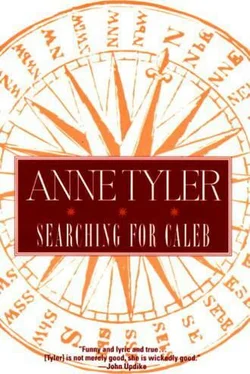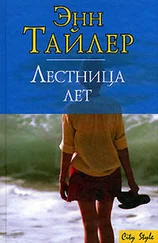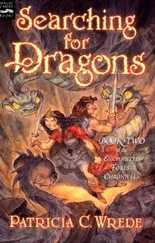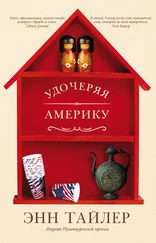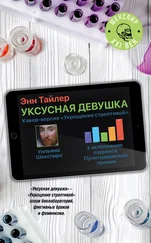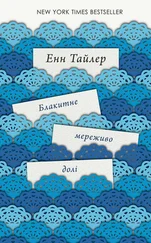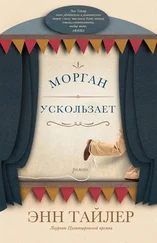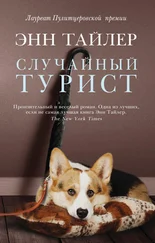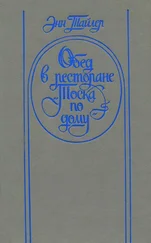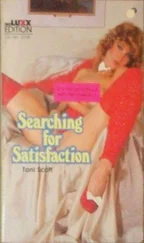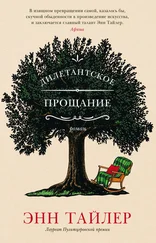But he had gone too far. Even he must have known that. When Justine turned away from him, fumbling for something in her purse, he said, “Anyway!” He jumped up and started pacing the floor. “Well, anyway, tell me all the news,” he said.
“Oh . . . ”
“Come on!”
“There’s nothing much.”
“Nothing? Nothing in all those four enormous houses?”
“Well, Aunt Bea has had to get glasses,” Justine said.
“Ah.”
“She’s very shy about them, she wears them on a string tucked inside her blouse. She takes them off between sentences in a newspaper even.”
“So Aunt Bea has glasses.”
“And Mama’s bought a TV.”
“A TV. I might have known it would come to that.”
“Oh, it’s not so bad, Duncan. It’s very convenient, don’t you think, having a moving talking picture in your home that way? I wonder how they do it.”
“Actually it’s quite simple,” said Duncan. “The principle’s been around for decades. Have you got a pencil? I’ll show you.”
“Oh, I wouldn’t understand,” Justine said.
“Of course you would.”
“But I’m not scientific. I don’t see how you know those things.”
“Those things are nothing,” he said, “it’s the others I don’t get. The ones you take for granted. Like mirrors, for instance,” and he stopped his pacing to wave at the mirror on the opposite wall. “I lay awake the other night going crazy over that. I spent hours trying to figure out the laws of reflected images. I couldn’t measure the angles of refraction. Do you understand it? Look.”
She stood up and looked. She saw herself in the speckled glass, nothing surprising.
“How come it shows my image and not yours?” he asked her. “How come yours and not mine? How come eyes can meet in a mirror when you’re not looking at each other in real life? Do you understand the principle?”
In the glass their eyes met, equally blue and distant, as if the mirror were reflecting images already mirrored.
Duncan turned around and set his hands on her shoulders and kissed her on the mouth. He smelled of salt and sunlight. His grip on her was weightless, as if he were holding something back. When she drew away, he let his hands drop to his sides. When she ran out of the room he didn’t try to stop her.
* * *
Justine wouldn’t visit Duncan any more. Her grandfather kept coming around, pressing twenty-dollar bills into her hand, but she didn’t know what to tell him and so she took the money in silence. She stuffed it haphazardly into her jewelry box, feeling like a thief even though she never spent it. She quarreled with her mother over a print dress, saying it was old-ladyish, although before she had worn whatever her mother picked out. When school started she studied indifferently and had trouble getting to class on time. Esther had graduated and was teaching nursery school, but now the twins were commuting with Justine and they objected to her late starts. “Is that what you call the point of life?” Justine asked them. “Getting to a class on the dot of nine o’clock?”
The twins looked at each other. Certainly they had never meant to imply that it was the point of life, exactly.
On a Saturday night in October, Justine was watching television with Neely in her great-grandma’s study. Neely was stroking her neck up and down in a particularly rasping way, but she had been so short-tempered with him lately that she didn’t want to protest. Instead she concentrated on the television: a mahogany box with a snowy blue postage stamp in its center, showing a girl who had become engaged due to cleansing her face with cold cream twice a night. She flashed a diamond ring at her girlfriends. “ Your diamond’s going to be twice as big,” said Neely. “My father’s already promised me the money.”
“I don’t like diamonds,” said Justine.
“Why not?”
“I don’t like stones that are transparent.”
On the television, a man held up a watch that would keep running steadily through everything, even a cycle in a washing machine.
“How about me?” Neely asked.
“What?”
“Do you like me? ”
His finger kept annoying her neck. Justine winced and drew away.
A man in downtown Baltimore was interviewing people coming out of a movie theater. He wanted to see if they had heard of his product, an antibacterial toothpaste. “Goodness, no,” said a lady.
“Well, think a minute. Say you have a cold and get over it. You wouldn’t want to catch it right back again from your toothbrush, would you?”
“Goodness, no.”
He stopped a man in a raincoat.
“Sir? Have you ever thought how risky it is, using the toothbrush you used when you were sick?”
“Why, no, now I never considered that. But you got a point there.”
He stopped Duncan.
“Say!” said Neely. “Isn’t that your cousin?”
Duncan was wearing some dark shade of jacket that Justine had never seen before. His face was clamped against the cold. There was no one in the world with such a pure, unwavering face. He stooped a little to hear the question, concentrating courteously with his eyes focused on something in the distance. When the man was finished Duncan straightened and thought a moment.
“Actually,” he said, “once your body’s built up enough resistance to overcome those bacteria in the first place it’s very doubtful if—”
The man discontinued the conversation and ran after a fat lady.
Justine went to the front hall for her coat. “Justine?” Neely called. She ignored him. Probably he thought she was out of hearing, maybe gone to the kitchen for soft drinks. At any rate, he didn’t call again.
All she told herself was that she owed Duncan a visit. He was her cousin, wasn’t he? And she really should give him their grandfather’s money. (Which was still crammed in her jewelry box at home.) She had herself convinced. But Duncan must have known exactly how her mind worked, because when he opened the door he stood looking at her for a minute, and then he drew her in and kissed her, and then he said, “Look, I can see the layers sliding across your eyes like shutters until you can properly explain this away.” Then he laid her on his bed, with its hollow center that rolled her toward him so that she could feel his warm bones through the thin white fabric of his shirt. He took off her clothes and his. Still she didn’t make a single objection, she said none of the things that she had said to Neely. She felt happy and certain, as if everything they did was already familiar. She seemed to be glinting with some secret laughter at this newer, more joyous mischief that they were just inventing, or at Duncan’s Puckish face turned suddenly gentle, or at her own self in his mirror eyes, a naked girl wearing a Breton hat.

6
Duncan came home in March of 1953. He walked into his great-grandma’s dining room one Sunday at dinnertime. “Duncan!” his mother said, half rising. Then, “What on earth is that you’re wearing?”
He was wearing a peajacket he had bought from Navy surplus. His hair needed cutting. He had been gone nearly a year and in that time his face had changed in some indefinable way that made him an outsider. The grownups stared and his cousins gave him self-conscious, sidelong glances. All but Justine, who raised her face like a beacon and smiled across the room at him. He smiled back.
“Well, my boy,” his grandfather said. “So you’re home.”
“No,” said Duncan, looking at Justine.
But they didn’t believe him. “Pull up a chair,” his mother said. “Take mine. Get yourself a plate. Have you had one decent meal since you left us?”
Читать дальше
